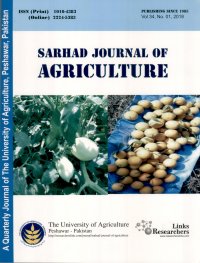Measuring the Global Trade Competitiveness of Pakistan’s Cotton Crop
Zarqa Khalid1*, Muhammad Asad ur Rehman Naseer1, Raza Ullah1 and Shahzad Khan2
ABSTRACT
Cotton is the most considerable non-food cash crop of Pakistan and it contributes significantly to the national income of the country. Cotton supplies raw material to the domestic textile industries and is also exported in the raw and processed form to other countries. Pakistan was a net exporter of cotton but now becomes a net importer due to its continuous domestic consumption and stagnant yield. This study aims to assess the trade competitiveness of cotton crop for the world’s 10 leading cotton exporters using revealed comparative advantage indices and relative competitive advantage indices such as Revealed Comparative Advantage (RCA), Revealed Symmetric Comparative Advantage (RSCA), Relative Import Advantage (RMA), Relative Export Advantage (RXA) and Relative Trade Advantage (RTA). The data were taken from the International Trade Center (ITC) UN-COMTRADE Statistics of cotton export and import from 2009-18. The findings revealed that Pakistan has a competitive and comparative advantage in exports of cotton while having a disadvantage in imports of cotton and also has no specialization in its exports. The results suggested that Pakistan has to explore new potential markets to strengthen its comparative and competitive advantage as well as raise cotton export earnings.
To share on other social networks, click on any share button. What are these?







